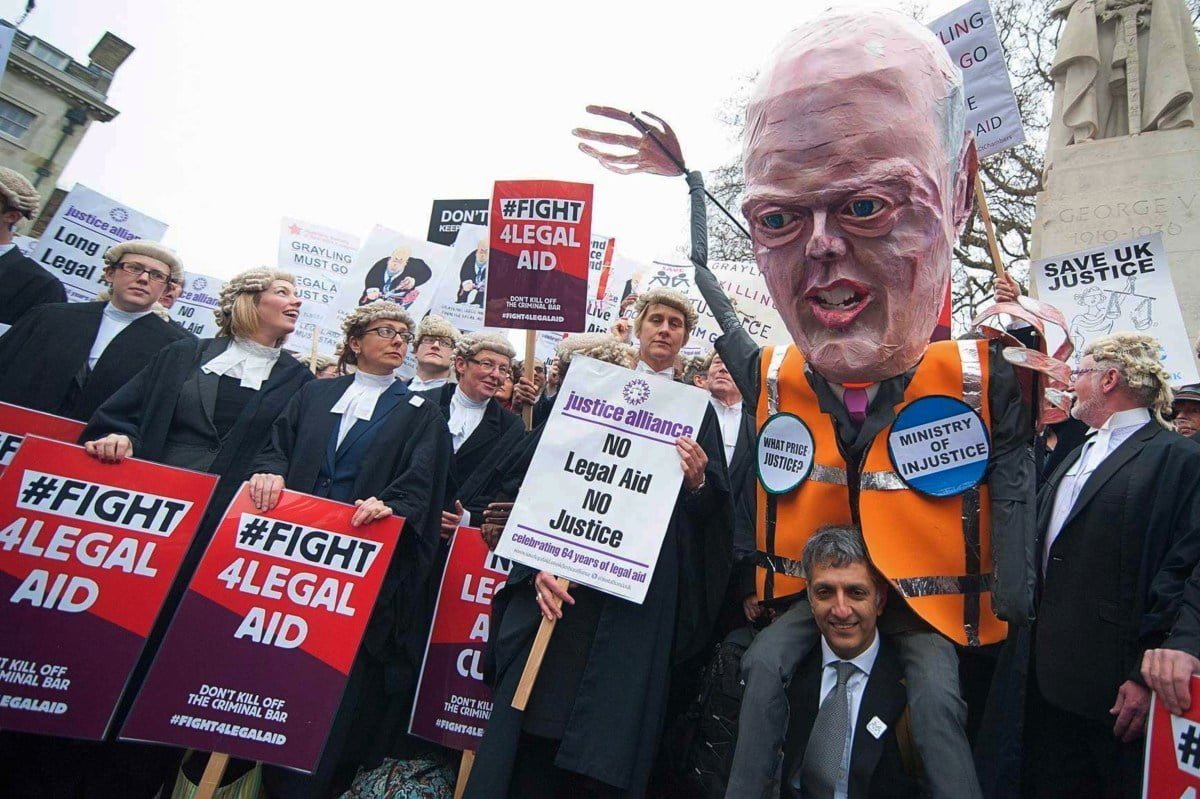Lawyers of the Criminal Bar Association (CBA) this week voted in favour of industrial action that will effectively bring the court system to a standstill. This is the latest move and a significant escalation in the fight against government cuts to legal aid, amounting to 8.75% – enough to put many small firms and self-employed barristers out of business completely.
Lawyers of the Criminal Bar Association (CBA) this week voted in favour of industrial action that will effectively bring the court system to a standstill. This is the latest move and a significant escalation in the fight against government cuts to legal aid, amounting to 8.75% – enough to put many small firms and self-employed barristers out of business completely.
Following on from a half day strike in January last year, and a similar ‘go-slow’ policy in January 2013 which was quite effective, barristers have voted 982 to 795 in favour of refusing to accept new legal aid work dated after 1 July 2015, and to refuse to accept ‘returns’, i.e. covering the work of other barristers who have been tied up in cases that have overrun in court or clashed for some other reason.
The outcome of the ballot is made more significant by the fact that the leadership of the CBA is opposed to the move. The recently elected vice-chair of the CBA, Francis Fitzgibbon, led the campaign against taking industrial action, supported by many senior barristers and Circuit leaders. Michael Gove, the Tory Justice Minister, confirmed the CBA leadership’s opposition to the action, saying that he did not believe that the leadership felt that action was “necessary at this time”.
In fact, as Mark George the leader of the ‘yes to action’ campaign pointed out, it was the junior barristers – who rely almost exclusively on legal aid work to make a living – who voted in favour of taking action. This is despite the fact that it will be very costly for these workers to refuse to accept the cases they rely on to survive. That they are willing to take such action demonstrates the scale of the medium-to-long term threat faced by lawyers as a result of the cuts. As one pro-action senior barrister put it: “I would be very worried [at the prospect of turning down work] if I were a junior barrister only doing legal aid work, but then what choice do they have?”
What is also significant is that, as we noted during the strike action in January 2014, this action is explicitly being taken in solidarity with solicitors who have gone on effective strike, refusing to accept legal aid work until recent cuts are reversed. Barristers and solicitors have traditionally viewed each other with suspicion, but are being pushed together into taking collective action against the government. The next step is for this to spread to court staff and the broader labour movement.
One London-based barrister said: “The vibe amongst criminal lawyers is very bad – 8.75% cuts in two successive rounds is making the work nearly entirely unprofitable…in short, the feeling is bleak.” And he explained that there are fears among some barristers that, because they are self-employed without much of a tradition of collective action, certain individuals will break ranks and hoover up all the cases being refused by those taking action. Furthermore, there are different shades of opinion around the country. In London, where firms and individual lawyers can be propped up by big private clients, the cuts will have a more limited (but still severe) impact. However this is not the same story elsewhere. One barrister described the Manchester legal circuit as “a real hotbed of dissent and activism”.
The individualist streak and geographical differences in the legal profession points to the clear need to form a national lawyers’ trade union, affiliated to the TUC, that can defend collective rights and enforce collective action in cases like this.
As we have explained before, Marx and Engels spoke of capitalism “stripp[ing] of its halo every occupation hitherto honoured and looked up to with reverent awe. It has converted the physician, the lawyer, the priest, the poet, the man of science, into its paid wage labourers”. Under the pressure of capitalist crisis the market is venturing into areas it previously has never even looked at. The legal profession is one such area, and the fight over cuts to legal aid is a fight for the livelihoods of people who may have previously considered themselves quintessentially middle class. But the history of capitalism is the history of tearing open new markets to make greater profits through super-exploitation and economies of scale. If lawyers want to stop this happening to the legal profession, the struggle against legal aid cuts has to be a struggle against capitalism.
Meanwhile, it will be those people who are most vulnerable to abuses and mistakes at the hands of the criminal justice system who will also suffer from these legal aid cuts. Legal aid is made available to people who cannot afford to hire a private lawyer. Cost-cutting and privatisation in this field will lead to a collapse in standards, as well as refusing many people access to legal representation, potentially putting the liberty of innocent people at risk.
More and more people are coming to the conclusion that capitalism and injustice go hand in hand. We have to fight alongside all those, both lawyers and defendants, who rely on legal aid. Ultimately we have to recognise that under capitalism there can be no justice for the working class. Our fight has to be against the system as a whole, and for the socialist transformation of society.






